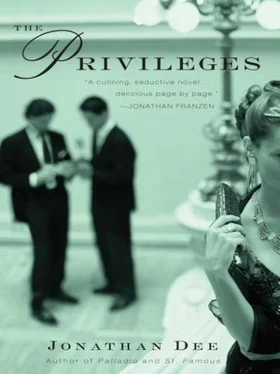Next it was pennies: he would arrange them by year, once he’d learned his numbers, and then he’d arrange them by color, really by gradations of dirtiness, from the bright polish of the new ones to the murky greenish-bronze that made the man on the penny look like he was sitting and thinking about something on a bench inside a cave. Then his mother was talking to another mother in the playground and after that she showed him how to bring the shine out of all the pennies by soaking them in lemon juice. That was a lot of fun — like leading the penny man outside where it was light — though it was also the sort of fun that could only be had once and then it was done. This was often the case when grownups got involved.
There was one morning when Jonas walked into the living room to ask his mother for Oreos before dinner even though he knew he wasn’t going to get them; he saw her sitting on the window seat, holding onto her knees, looking out the window, like she was sad about something she couldn’t find. Think, she often said to him. Where did you have it last?
He loved it when she played with him, but when it came to the collecting she had a way of getting too involved. Like when Grandma Ruth sent him one of those state-quarter sets. His mother would go through her own quarters before he’d even seen them; she knew the ones he was still missing and she’d just walk into his room and hand them to him. Or later when he started reading the Nate the Great books. She saw he liked the first three and so she went out and bought the entire rest of the series, numbers four through sixteen. When it was almost more fun not to have them yet — to know they existed out there somewhere and waited patiently to be found. He didn’t know how to tell her this.
Of course she didn’t only bring him things he’d asked for. Once in a while she’d buy a few CDs and they’d sit on the living room floor and listen, and if there were one or two he didn’t show any interest in, they probably wouldn’t play those again. There was one called Flight of the Bumblebee— as soon as that one was over he asked if he could hear it again, and his mother’s face softened, like that was what she’d been waiting for. Pretty soon she told him that he didn’t need to ask permission every time. He knew how to operate the stereo himself though he wasn’t supposed to fiddle with the volume knob.
April said one day that if she heard Flight of the Bumblebee one more time she’d go postal. He didn’t know what that meant but it made him self-conscious so he didn’t play it again for the rest of that day.
“He’s got an unusual attention span,” he heard his mother telling someone else in Zabar’s one day. “For a kid his age, a boy especially, he can focus on one thing for a long time.”
He finally found a way to pursue his interests without having to worry about others spoiling it with their own enthusiasm or else getting their feelings hurt: he started a secret collection, which, given his limited freedom of movement in the outside world, pretty much restricted him to collecting things from inside the apartment. Also, in order to maintain the collection’s integrity as a secret, it had to consist of items people had forgotten about or would eventually be willing to forget about. He knew that this was pretty close to what people called stealing but he chose not to dwell on that. So far he had one of his mother’s lipsticks, a combination lock from his father’s gym bag, April’s hairband with the sunflowers on it, four different wine corks, his father’s empty money clip (this he had found serendipitously under a couch cushion), an electricity bill, one photo from his parents’ wedding album, April’s preschool report card that said she had a “quick temper,” two mismatched earrings from the bottom of his mother’s purse, a tiny wooden carving of a cat from Dad’s boss’s house in Connecticut, and a book light that clipped onto the top of the book you were reading in bed. That last one almost undid the whole project, because his mother had searched for it with unusual thoroughness before giving up.
No one ever looked in the old Lego box that was inside a drawstring bag that was at the bottom of the toy chest that he sat on to read or to draw. He didn’t need to look inside the box to remind himself what was in there — he could tick off its contents in his head at any moment of the day, or while lying in bed at night — but once in a while he liked to open it up anyway. It made each item seem even more valuable to know that everyone else had given up on it, because he was the only one in the family who knew the secret, which was that things might disappear but, thanks to him, rarely was anything ever really lost. He held each object between his fingers for a while, recommitting it to memory; then he packed them all away and opened the door of his room and walked past his mother at the kitchen table and into the living room to hear Flight of the Bumblebee again.
For Christmas break they were going to a resort in Costa Rica; some guy from Morgan Stanley Adam still played basketball with had said the beaches there were the most beautiful beaches on earth. To the kids, one resort was the same as another, which was to say a kind of paradise where all strangers were nice to you and your parents never said no to anything or asked how much it cost and all you had to do to get anything you wanted was to pick up the phone. April was also mindful, though she knew she shouldn’t be, of the jealousy these trips engendered in some of her school friends, who maybe got to go skiing for a couple of days or spent the break in Florida in the hot, featureless homes of their grandparents.
Just a week or so before they were due to leave, the most recent hire at Perini — a guy named Bill Brennan, just barely out of college, whose junior status was unfortunately cemented by the fact that he was only about five feet six — strode around the office tossing postcard-style invitations on everyone’s desk. “Some buddies of mine are opening a bar,” he said. “Grand opening tonight. Actually, I have a piece of it too. You have to come. All of you are comped. They have to get some buzz going. Every hot woman I know will be there. Adam, dude, it’s on 89th and Second, right in your backyard. You have to come. I know it’s not your thing anymore.”
“Fuck you it’s not my thing anymore,” Adam said, laughing. He called Cynthia and told her to get the sitter they used, or some other sitter, it didn’t matter. They hadn’t been to a real meat-market bar like that in a long time, long enough that everything about it seemed hysterical now. The men — if you could even use that word, since despite their suits and loosened ties they all looked about twenty years old — nodded meaningfully to the pounding music and generally stood around hoping for disinhibited women to fall on them like some humanitarian airdrop. Parker and the rest of them were in heaven. Brennan comped all their drinks, but it was so crowded that it took Adam almost fifteen minutes to complete the round trip to the bar from the spot they’d staked out against the wall. By the time he made it back from his third go-round with a Scotch for himself and a vodka and soda for Cynthia, she was holding a different, brand-new drink someone else had bought for her; she was visibly smashed, and encircled by strange, hyena-like guys.
“This, losers, is my husband,” she shouted when she saw him, because you had to shout in there to say anything at all. Even so, they smiled and nodded and were likely only pretending to have caught, or cared, what she was saying. A beautiful drunk woman standing alone, even for five minutes, drew these guys like touts at a racetrack; they were too young and callow even to check for a wedding ring. “He is more of a man than any of you will ever be. Especially you, fatso,” she yelled, gesturing to one guy, who just smiled.
Читать дальше












